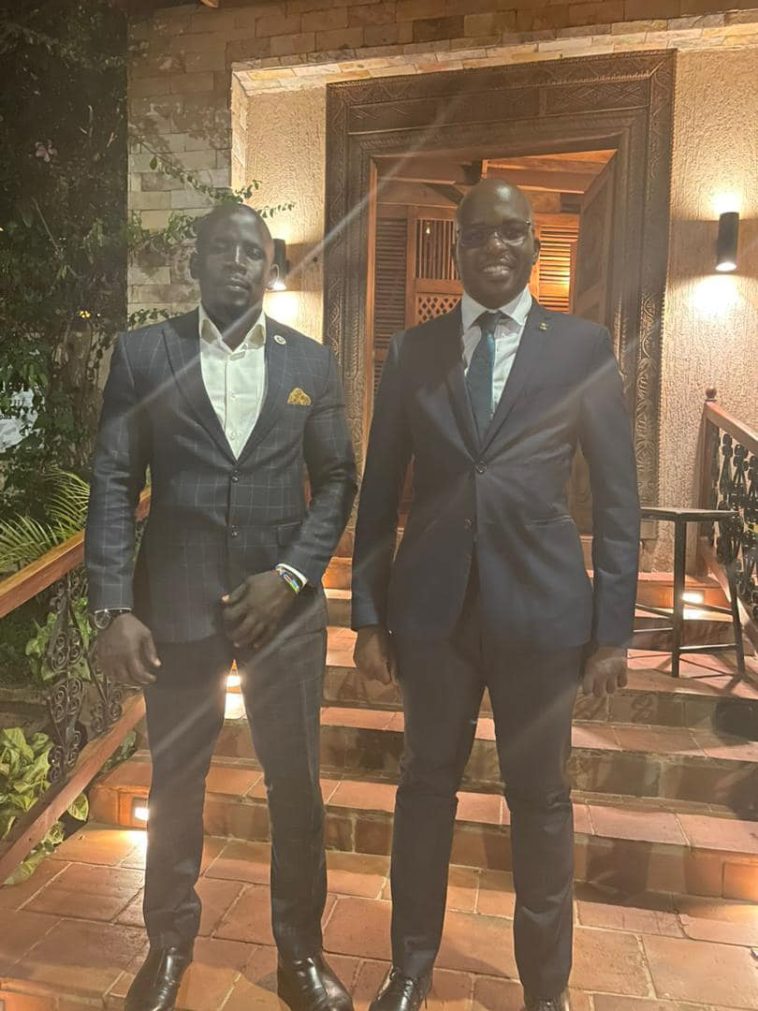This week, a screenshot of a WhatsApp message has been the subject of intense debate and commentary on various social platforms. In it, a parent is complaining about the decision of one of Kampala’s privately held elite primary schools to give scholarships to less-fortunate children. The author contends that their “high-cost and highly maintained kids”, for whom they pay so much money, are being mixed with ghetto/street kids without their consent.
The full message is more revolting. My unedited thoughts about this kind of thinking are unprintable.
The debate reminded me of a childhood experience whose results showed up less than a year ago.
I hope that that parent reads my story and picks something from it:
One evening in 2000 (I was then a Primary Seven pupil at Greenhill Academy), my siblings and I had just been picked from school when the doorbell rang.
From his kennel, Ravy the dog barked, with tangible agitation. This was the first learned signal to everyone at home that the canine had smelt a stranger.
“Someone go check out who it is,” my mother instructed. We hated being asked to go see who had called because it meant missing scenes from Power Rangers, Sunset Beach, or suffering the inconvenience of pausing a game on the PlayStation.
Such was our collective relief when we heard Rebecca, one of two house helps, run to the gate.
The visitor was let in.
“Mummy, nayenda kugamba niiwe [Mummy, he wants to speak to you],” Rebecca reported.
“Nooha shi? [who is it],” my mother inquired.
“N’omwoojo; yiija n’egaari [It’s a boy; he came riding a bicycle],” Rebecca answered.
Mom used her feet to feel for her sandals on the ground and walked to the patio where the boy was. A few minutes of conversation got us curious, and one by one, we abandoned whatever we were doing, and jostled for space in a sash window to catch a glimpse of the stranger.
He was a young boy, my age, most likely. Ravy was growling and stomping furiously in his kennel, baying for blood.
At the invitation of mom, the boy wrestled his huge Hero model bicycle (the one without gears) and rested it on its side. She brought him indoors and we hastily left the sash window, racing back to the living room where we were watching TV and playing videogames.
“Come and sit here…iwe Rebecca; omwaana mumureetere ebyokurya [Rebecca, bring food for the child].”
From the dining table, mom scolded us for ignoring a visitor and ordered us to stop what we were doing and come say hello. Reluctantly, with long faces, we ambled towards him and mumbled our quick hellos, eager to return to the fun. Chris, the gregarious one, hugged the stranger. The rest of us didn’t catch more than a glimpse of him, let alone offer firm handshakes. This attracted more scorn from mom.
“After greeting him, switch off everything and go take your baths!” Sulking, we obliged and made for the bedrooms and bathrooms. Our fury was palpable. This boy who didn’t look like us, who clearly wasn’t very well dressed, and didn’t understand the cool stuff we were doing had decided to come at this hour.
Later, after the boy had left, dinner was served and mom narrated the incident to dad. Apparently, he requested mom to let him collect our garbage once a week for a meagre fee. He said he needed the money for his school fees. My parents agreed to find out more about his situation and see what help they could render.
Listening to their conversation, we asked naïve questions about why a young boy had to go through all that. Where were his parents? Wasn’t it dangerous for him to ride such a huge bicycle? At what time did he do his homework? Isn’t it disgusting to carry garbage bags with smelly refuse on a bicycle?
Dad began his response with a caution about the hardships of life. Fay, my sister, rolled her eyes as if to say, “not another lecture!” Old Man ploughed on about how we shouldn’t take our privileged circumstances for granted. Mom complimented him with Bible verses about humility and so on. After several minutes of what we considered drivel, the Professor wound up with an oft-told narration of his boyhood days in Ankore and Kigezi: long treks to and from school, farm work in the early morning, and the daily punishment for late-coming. As usual, we giggled at the hilarious bits. Mom chimed in with her similar version about growing up in Bushenyi.
We listened but obviously didn’t appreciate the gravity of their counsel. The tales sounded like adventures, and the intended message wasn’t conveyed. Some started yawning. It was time for the nightly tradition of bowing our heads to say The Grace, after which the cat-and-mouse games of being forced to go sleep would begin. These games would happen amidst pleas to play one more session or watch a late episode of WWE, and counter threats of kiboko (the cane).
As we collectively took part in clearing the table, the two house helps, Rebecca and Hope, teased us about our naïveté. After completing a crossword puzzle, Dad capped his Mont Blanc pen and pursed his spectacle case shut. He touched his lips with a napkin, gathered his newspapers and retired. Mom hovered around, supervising the dishwashing as Hope prepped the younger ones for bed.
Over the weeks, Bernard became a regular visitor at home. Ravy soon stopped barking at him. Mom cared for him as she did for us. We slowly warmed up to him, and even tried out his huge, poorly aligned rickety bicycle. Games were played with him, occasionally, and acquaintance became friendship.
In the coming months, boarding school beckoned some of us. Life’s shifting sands. Sadly, we increasingly saw less of our new friend. Where did Bernard go? Years passed, and that episode became a distant memory. It was overtaken by the joys and rigours of high school, adolescence, the Bunsen burner, pocket money, Steers, puppy love, novels, youth church at All Saints’ Nakasero, sleepovers, Nandos, rugby, basketball, the Premier League, elective subjects, owning one’s first mobile phone, heartbreak, voting, university, marriage for some, road trips, grief, the world of work, taxes, freedom, and independence.
In April this year, 2023, I was invited to a high-end rendezvous for young leaders. The setting was ornate and plush. Piped classical music wafted through hidden surround sound speakers while a small but ebullient crowd mixed and mingled. Waiters and waitresses kept different tribes of alcohol flowing. Tailored suits and fitting tuxedos for the men who were invariably sporting some brand of a designer cologne. The ladies were adorned in haute couture, gemstones, and delicate makeup. When the atrium filled up, Eugene, the MC, tapped his wine glass for attention and invited everyone to crossover for dinner. The dining was just as exquisite, and speeches were timed to last no more than six minutes.
As the glasses emptied and plates cleared, the DJ raised the tempo when he switched to dance floor genres and turned on the disco balls, coloured lasers, and strobe lights.
Lojay’s heavy beats got us out of our seats. Soon, a sea of giddy humans was swaying and shuffling to that hit, ‘Monalisa’!
It was an awesome evening, and I had made a mental note to say hello to a first-term Senator whose ample cleavage seemed to glow under the mood lighting.
But the attractive young lady was not the only person who had caught my attention. A few tables from me was a dark handsome bloke in a sharp suit. We repeatedly glanced at each other, and exchanged polite, but uncertain smiles. Two decades had changed a lot about our physiques, but I had a hunch that I knew him from somewhere. Just wasn’t sure.
Noticing the hints of confusion on my face, he walked up to me and broke the ice. His recollection was better than mine.
Over the heart-thumping sound of the music, he gripped my open palm and I leaned in. He bellowed: “you must be Andrew Karamagi…” I nodded, he continued, “your mother took good care of me, and she is my friend!”
Faint traces of recollection trickled in, and then, like an avalanche, the childhood memories rushed in. I remembered the small boy with a bicycle. “Are you Ben?” He nodded in the affirmative and we hugged for a long moment. His huge, chiselled frame enveloped my lean self.
After recovering from our shock and elation, we retreated from the dance floor to the quieter bar area where we recounted the days of our lives up to that point.
Despite my mother’s advice and concern over a young boy riding a bicycle whose handlebars were taller than him, Bernard Odoi kept on collecting rubbish through the suburbs of Muyenga, Bukasa, Namuwongo, and Kisugu, to fund his education. He did several menial jobs, including working as a site porter during the construction of Kampala International University.
Today, Bernard is a lawyer, and in 2021, was elected to serve as Youth Member of Parliament for Eastern Uganda! Outside the House, he is a founding Director of BenCity Holdings, a company which provides garbage collection, pest control, and cleaning services for more than two thousand clients.
This post was created with our nice and easy submission form. Create your post!






